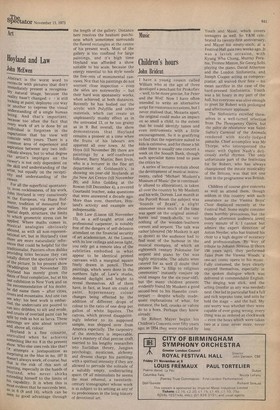Music
Children's hours
John Bridcut
I have a young cousin called William who at the age of three developed a penchant for Prokofiev
• — well, to be more precise, for Peter and the Wolf. Now I have often intended to write an alternative script for roisterous occasions, but I never realised that, Mozarts apart, the original could make an impact on so small a child, to the extent that he could identify tunes and even instruments with a little encouragement. So it is gratifying to find that the repertoire suited to kids is extensive, and for those a bit older there is usually one concert a week on the Soouth Bank, though. such specialist items tend to pass the critics by.
A series of lecture-recitals about the development of musical instruments, called 'Michael Musketes Museum of Music' (he is continually allured to alliteration), is taken all over the country by Mr Muskett and his wife, Doreen. Last month at the Purcell Room the subject was 'Sounds of Brass', a slight misnomer since much of the time was spent on the original animalhorns and Conch-shells, to say nothing of the wooden/leathern cornett and serpent. The talk was rather laboured (Mr Muskett is apt to drone) so the audience had to find most of the humour in the musical examples, of which an eighteenth century Polonaise for serpent and piano by Ozi was highly enjoyable. The adults were catered for as well (I doubt that phrases like "a fillip to religious ceremonies" instantly conjure up vivid images for the six-year-old), but tie many children present evidently found Mr Muskett a good second-best to his Hamelin counterpart — despite wholly inadequate explanations of what, for instance, the bell, crooks or valves do to a horn. Perhaps they knew already.
Sir Robert Mayer began his Children's Concerts over fifty years ago; in 1954 they were replaced by
Youth and Music, which covers teenagers as well. So Y&M celebrated its twenty-first anniversary, and Mayer his ninety-sixth, at a .Festival Hall gala two weeks ago. It was a lavish occasion, with Kyung Wha Chung, Murray Perahia, Yvonne Minton, Sir Georg Solti playing the piano, David Atherton and the London Sinfonietta, and Joseph Cooper acting as comperepianist; all waived their fees — no mean sacrifice in the case of the . hard-pressed Sinfonietta. Youth was a bit hoary in my part of the hall, but everyone was alive enough to greet Sir Robert with prolonged and affectionate applause.
The Sinfonietta excelled themselves in a well-turned selection from The Threepenny Opera, but the piece de resistance was SaintSa&-is's Carnival of the Animals, rendered with nicely-judged panache. Chief accomplice was Mr Thorpe, who interspersed the music with Ogden Nash's deliciously awful rhymes. The only unfortunate part of the festivities for Sir Robert, who has always championed the innate musicality of the Britons, was that not one item in the programme was British.
Children of course give concerts as well as attend them, though seldom in this country with such assurance as the Vienna Boys' Choir displayed recently at the Festival Hall. Some might consider them horribly precocious, but the Sunday afternoon audience loved every minute of it. I cannot but admire the expert direction of Anton Neyder, who has trained his choir to a high degree of accuracy and professionalism. By way of tribute to Johann Strauss II (born 150 years ago), they performed Tales from the Vienna Woods. a one-act comic opera to his music. Fully costumed, the boys clearly enjoyed themselves, especially in the spoken dialogue which was delivered in commendable English. The singing was slick, and the acting (insofar as any was needed) neat. One lad in particular had a full and rich soprano tone, and solo he held the stage — and the hall. My one worry was whether they were capable of ever going wrong: every thing was as ordered as clockwork — even the bows which were taken two at a time: never more, never less.


































 Previous page
Previous page